How to study: master the basics - derive the details
Key message: Experts (good learners) organize their knowledge around "basic ideas", creating a "network of information". Novices tend to learn isolated facts and formulas that they are likely to forget quickly.
Some people say, "Perfectionism doesn't get you very far in studying. Learn for the exams. Anyone who wants to understand everything in depth will fail." It is impossible to understand everything in depth, but if you don't try to master at least the basics and a few methods "perfectly", you won't be able to solve any difficult problems after your studies.
What is the most important goal of a university degree?
For students it is important to pass all examinations with the best possible results. Only a few have a clear idea of what they need to be able to do after their studies.
"Future employers [and society] expect university graduates to solve problems in practice. ... It's about teaching and acquiring basic knowledge and methods, the ability to
define and solve problems." (Lange J.(2013) Herausforderungen in Lehre und Studium, www.stifterverband.com/forum_hochschulraete/update/update_2013-02/schwerpunktthema/lange/index.html,
06.04.14)
For a job with routine tasks, you don't have to study in university.
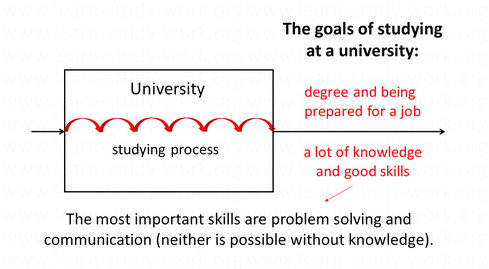
The urgent problems of our time can only be solved by people who have many innovative ideas. So the most important skills after a degree are communicative competence and analytical-creative thinking (necessary for solving problems).
"In case of a problem, there is discrepancy between an actual and a target value [state], there is a barrier between the two states [which must be overcome] ... In a task, there is a mental requirement, but the methods for coping are known. ... The difference between problem and task depends on prior knowledge, ... i.e., the same situation may be a task for one person and a problem for another ..." (www.psychologie.uni-heidelberg.de/ae/allg/mitarb/ms/PH_Einfuehrung.pdf, S. 11, 02.04.14, pages 1 - 13 are of interest)
After a professional training, one should be able to perform tasks and solve smaller problems in the respective professional field. A university degree should provide the ability to solve larger problems, even those that arise unexpectedly.
An example: A doctor makes the diagnosis and decides on the therapy, which is carried out by a healthcare professional. The doctor solves the problem and the healthcare professional has the task of optimally performing the specified therapy, which is not easy and requires a lot of experience. (People who work well, no matter what their profession and their degree is, are valuable.)
"Complex problem solving is part of our daily life: finding the right person to share one’s life with, choosing a career that not only makes money, but that also makes us happy. Of course, CPS is not restricted to personal problems – life on Earth gives us many hard nuts to crack: climate change, population growth, the threat of war, the use and distribution of natural resources." (Dörner, D., & Funke, J. (2017). Complex problem solving: what it is and what it is not. Frontiers in psychology, 8, 1153, S. 6)
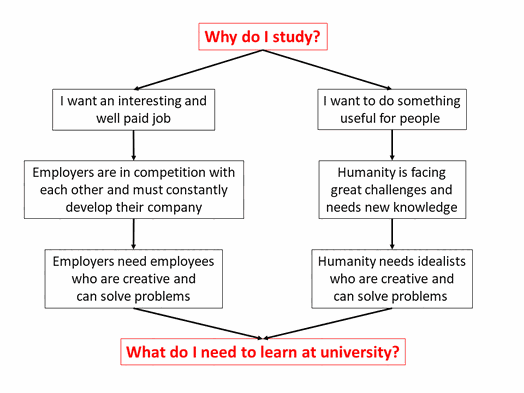
Knowledge, analytical thinking and creativity are the prerequisites for solving difficullt problems: Knowledge should include understanding - Understanding requires analysis - Creativity is drawing correct conclusions from analysis when the information available through that analysis is limited (see on Learn-Study-Work "How to be creative").
"As Nobel laureate Herbert Simon wisely stated, the meaning of 'knowing' has shifted from being able to remember and repeat information to being able to find and use it (Simon, 1996)." (https://nap.nationalacademies.org/read/9853/chapter/3#5, 09.02.24, p. 5)
The ability to communicate well is also a prerequisite, as difficult problems cannot be solved alone. You have to be willing to learn from others.
"Analytical thinking and creative thinking remain the most important skills for workers in 2023. Analytical thinking is considered a core skill by more companies than any other skill and constitutes, on average, 9% of the core skills reported by companies. Creative thinking, another cognitive skill, ranks second ... The core skills top 10 is completed by two attitudes relating to working with others – empathy and active listening and leadership and social influence ..." (https://www.weforum.org/publications/the-future-of-jobs-report-2023/digest/, 08/27/24)
What is knowledge?
The word "knowledge" has two meanings:
- Knowledge means just knowing something. A person's knowledge is the facts and rules that the person has stored in his memory.
- Knowledge means "knowing how", i.e. the ability to apply facts and rules. This meaning is also called skill or competence.
Skills "... means the ability to apply knowledge and use know-how to complete tasks and solve problems." (https://eur-lex.europa.eu/legal-content/EN/TXT/HTML/?uri=CELEX:32017H0615(01)&from=DE#d1e32-20-1, 14.11.20, annex 1)
Does knowledge concist of facts and rules?
"Knowledge is usually understood as a body of facts, theories, and rules available to individuals or groups ..." (https://de.wikipedia.org/wiki/Wissen, 02.08.21)
What is the difference between theories and rules? In science, rules are often called "scientific laws".
"Scientific laws are similar to scientific theories in that they are principles that can be used to predict the behavior of the natural world. ... Usually scientific laws refer to rules for how nature will behave under certain conditions, frequently written as an equation. Scientific theories are more overarching explanations of how nature works and why it exhibits certain characteristics." (Poulsen, T. (2010) Introduction to Chemistry. CK-12 Foundation, https://openedgroup.org/books/Chemistry.pdf, p. 15)
So theories are a combination of rules to comprehensively explain a particular subject. Therefore, knowledge consists only of facts and rules.
"A fact is an objective observation or measurement, verifiable by any trained observer." (Moores, E. M., Twiss, R. J. (2014) Tectonics. Long Grove: Waveland Press, page 248)
"In the broadest sense, a rule could be any statement which says that a certain conclusion must be valid whenever a certain premise is satisfied, i.e. any statement that could be read as a sentence of the form 'if ... then ...' ... " (Hitzler P., Krötzsch M., Rudolph, S. (2009). Foundations of Semantic Web Technologies. Chapman & Hall/CRC, page 213 - 216)
Rules are conditional statements that indicate what result is obtained if a certain condition is met: if this condition is met,
then this result is obtained.
Example of a rule: If I want to calculate the area of a rectangle, I can use the formula: Area A = Length x Width. The formula is a rule: if I multiply the length by the
width, then I get the area of the rectangle. But this is only possible if I know the values for the length and the width. The values are facts.
Another example: The rule of natural selection in the development of the eye
"Isn't it a miracle that the earth's atmosphere transmits exactly the wavelengths of visible light (about 380 to 780 nm) that our eye can see? ... [No], because the eye has evolved just on
the basis of this fact. ...
It is not the end result that comes about by chance, but only its starting point ... A complex end product like the eye arose ... by rules and laws of formation - from simpler precursors. ...
Those, and only those, may have come about by chance. In the case of the eye, a gene mutation was at the beginning, which made a protein ( called "opsin") sensitive to light." (Beetz, J.
(2016). Feedback. Springer Spektrum, Berlin, Heidelberg, p. 325 - 329)
All knowledge, that is not a rule, I count as facts (how the facts are further divided is not clear to me at the moment). Why is it useful to distinguish between facts and rules? Because many people do not consider all the rules that apply to an issue and therefore make mistakes.
Example for the application of rules and facts: Rapeseed moves from top to bottom through a container and is dried with hot air in counterflow (see picture). The rule is that hot air can
absorb a lot of moisture. In order to improve the drying performance, additional heating elements are to be installed in the container. Is it better to arrange them lengthwise or should the
heators be made of transverse pipes? This question can be answered by applying another rule: it is advantageous if the material to be dried is heated evenly. In the case of transverse pipes,
all rapeseed grains on their way from the top to the bottom come once near a hot pipe, in the case of longitudinal radiators, the same grains are always near the heating surface. Of
course there is a temperature that must not be exceeded so that the rapeseed is not damaged. This temperature is a fact that you need to know.
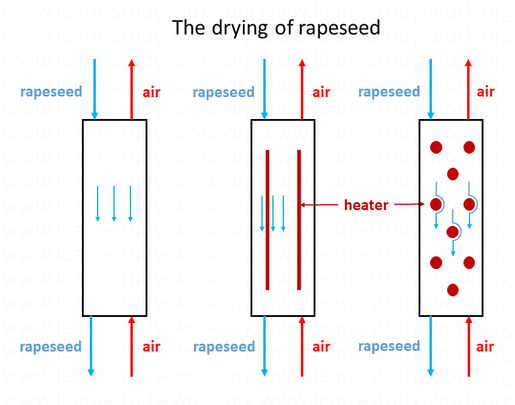
What kind of knowledge should students acquire during their studies?
Many students believe that the goal is to be able to remember as much knowledge as possible after graduation. The knowledge should be broad and profound. In other words, one should as much knowledge as possible in as many areas as possible. Formulated in this way, doubts arise as to whether this is possible at all. The human brain is not a hard disk that can store " an infinite " number of details (see on Learn-Study-Work "How to learn").
There are three levels of knowledge: superficial knowledge, understanding knowledge, and expert knowledge. The boundaries between these three levels are fluid.
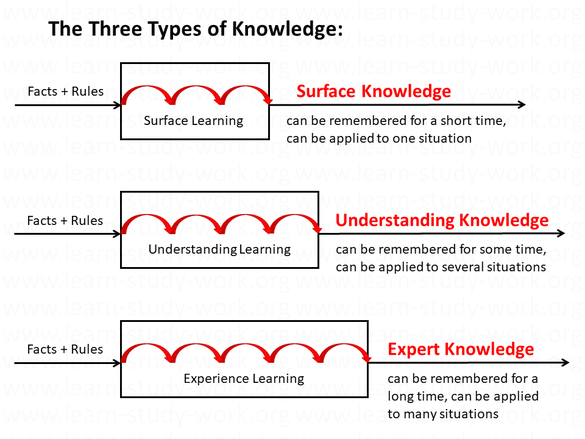
"Biggs (1987) distinguished between three major approaches, namelydeep,achieving, andsurface. Deep learners are intrinsically motivated and enjoy exploring the subject matter as muchas they can. On the other hand, achieving students are extrinsically motivated and want to do well because of the rewards attached to high performance. Finally, surface learners are interested in learning the indispensable facts only and expend minimum effort to achieve this." (Chamorro-Premuzic, T., & Furnham, A. (2008). Personality, intelligence and approaches to learning as predictors of academic performance. Personality and Individual Differences 44, p. 1597)
Which learning approach makes sense is not just a question of motivation, but depends above all on what goal I want to achieve. That's why I changed the names for the approaches.
1. Superficial learning
I have to pass an exam, but I don't have the time to study much for it, or the subject is not important to me and I just want to pass the exam. Then superficial learning makes sense. I memorize
all the facts and rules and understand them only to the extent that I can apply them in the situation required by the exam. I will quickly forget this "surface knowledge" after the exam.
2. Understanding learning (competence oriented learning).
I have to study for an exam and I want to get a good grade. Then I try to understand the subject because I need to be able to apply the knowledge to several different situations in the exam. I
can remember this "understanding knowledge" for a while. (If I don't apply it again, I will forget it one day.) "Understanding knowledge" is called competence.
3. Expert learning
When I want to understand a subject deeply, I apply my knowledge of that subject to many problematic situations. After some time, I have gained a lot of experience. This "expert knowledge" will
stay in my memory for a long time.
A course of study is too short to become an expert in that time. But the goal must be to acquire as much understanding knowledge as possible. Then you have the prerequisite to develop further.
"With the professional qualification, the first degree provides you with the tools you need to start your career, but not for a whole professional life. University graduates must therefore study in such a way that they are capable of further training in order to further orient and qualify themselves in science and in the profession." (www.stifterverband.com/forum_hochschulraete/update/update_2013-02/schwerpunktthema/lange/index.html, 06.04.14)
Definition: Intelligence is the ability to solve difficult problems on your own, combined with the ability to learn from experience.
What would the ideal university study look like?
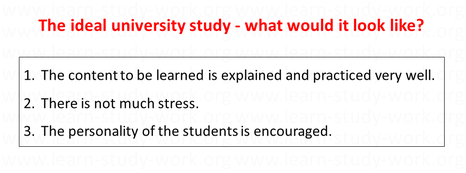
1. How to explain and practice the material to be learned very well?
"An explanation is a set of statements usually constructed to describe a set of facts which clarifies the causes, context, and consequences of those facts. This description may establish rules or laws, and may clarify the existing rules or laws in relation to any objects, or phenomena examined.[1]" (https://en.wikipedia.org/wiki/Explanation, 27.01.22)
An explanation answers the question of "why" by making the causes of something understandable to another person. The reasons can be valid rules (laws) or facts.
Example:
1. In our solar system the planets orbit around the sun. The rule applies that bodies attract each other because of their mass (gravitation). Why is the sun there? One must accept the existence
of the sun as a fact, because there are hypotheses about the origin of our universe, but why the sun is exactly where it is cannot be explained (maybe later).
2. Question to the doctor: "Why did you give this medicine?" Answer: "A study found it to be 80% effective." The efficacy probability can be taken as fact.
It is important to see the rules and facts behind an issue, because a very good explanation not only answers the question of "why". It also tells what the learned can be used for. The goal of an explanation is understanding. Therefore we have to ask ourselves: Understanding something - what does that mean?
"To grasp the meaning of a thing, an event, or a situation is to see it in its relations to other things: to see how it operates or functions, what consequences follow from it, what causes it, what uses it can be put to." (Dewey, J. (1933). How We Think: restatement of the relation of reflective thinking to the educative process. Boston, D.C. Heath and Co., p. 137)
If you want to understand a thing, you have to analyze it. Only those who practice can analyze well:
Every thing is part of a system and is also a system itself (the only exception would be the "smallest indivisible particle"). An event always takes place in a situation, a situation is a system at a certain point in time. A system consists of elements: If you want to understand a system or an element of a system, you have to examine the relations among the elements, recognize the rules that apply to these relations and then draw conclusions (see on Learn-Study-Work "How to analyze situations = systems"). The recognized facts and rules can then be applied to other systems (if they "fit" there).
"Understanding is about transfer ... To be truly able requires the ability to transfer what we have learned to new and sometimes confusing settings. ... It is an essential ability because teachers can only help students learn a relatively small number of ideas, examples, facts, and skills in the entire field of study; so we need to help them transfer their inherently limited learning to many other settings, issues, and problems." (Wiggins, G., & McTighe, J. (1998). Understanding by design. Alexandria, VA: ASCD, p. 40, 10.12.21)
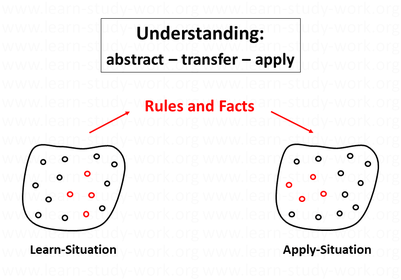
"The fact that experts are more likely than novices to recognize meaningful patterns [rules] of information applies in all domains ... An emphasis on the patterns perceived by experts suggests that pattern recognition is an important strategy for helping students develop confidence and competence. ... Studies ... demonstrate that experts first seek to develop an understanding of problems ... Novices ... are more likely to approach problems by searching for correct formulas and pat answers that fit their everyday intuitions." (National Research Council (2000). How People Learn: Brain, Mind, Experience, and School: Expanded Edition. Washington, DC: The National Academies Press, p. 48-49, www.nap.edu/read/9853/chapter/5)
If you organize the recognized rules and facts, you can remember them better. This includes knowing in which situations they can be used.
"We turn now to the question of how experts’ knowledge is organized and how this affects their abilities to understand and represent problems. Their knowledge is not
simply a list of facts and formulas that are relevant to their domain; instead, their knowledge is organized around core concepts or “big ideas” [big rules] ... Experts have not only acquired knowledge, but are also good at retrieving the knowledge that is relevant to a particular task."
(www.nap.edu/read/9853/chapter/5, p. 36 and 43)
What does the order around a "core concept (= main statement) look like?
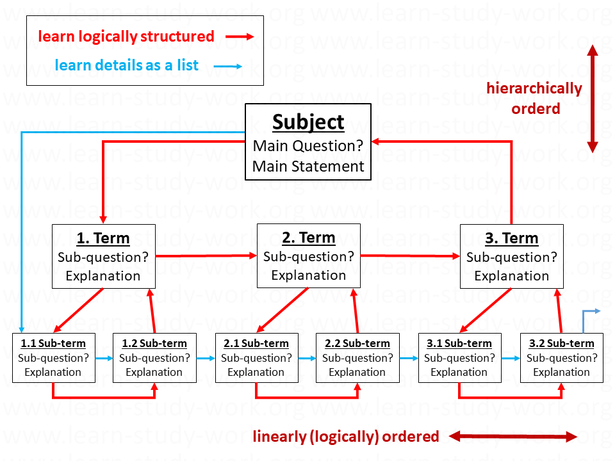
A main statement is to be explained. First we consider which generic terms belong to the main statement. To be able to explain the first generic term, we need 2 sub-terms here. The two sub-terms represent the lowest level in this case. They are explained in a logical order. Then we jump back to the generic term. To fully understand its explanation, we need to summarize what we learned from the sub-terms in one sentence (we draw a conclusion). When we have thus explained all the generic terms, we jump back to the main statement and formulate an explanation sentence for the main statement that contains the most important reasons why the main statement is correct.
A good explanation does not use terms whose meaning is not precisely known. Otherwise unknown terms must be defined (see Learn-Study-Work "How to define words").
Example: If I want to explain what "scientific work" means, then I also have to explain the sub-terms "science," "research," "scientific methods," and "research design" (see on Learn-Study-Work "What is Science? What is Research?", "What are scientific methods?")
Other examples of good explanations on Learn-Study-Work: "What is Respect?", "How to write a text", ...
A good explanation answers the following questions: How did the knowledge that is to be explained come about? To which situations does the knowledge apply? What general rules can be abstracted for the situations under consideration? When do the rules apply and when do they not? What facts must be known in order to apply the rules? Where and how are the rules applied in practice?
Many people are not good at explaining because they lack analytical thinking.
They can break down an object (a situation = a system) into its parts, but they don't do it conscientiously (they only analyze
superficially). Once they find a possible conclusion, they rashly stop the analysis. Therefore they cannot explain how all parts of the object work together to form the "whole" (the "whole" is more than the sum of its
parts).
"Persons with very high scores on the Conscientiousness scale organize their time and their physical surroundings, work in a disciplined way toward their goals, strive for accuracy and perfection in their tasks, and deliberate carefully when making decisions." (https://hexaco.org/scaledescriptions, 07.02.22, search with Google)
"It's not that I'm so smart, it's just that I stay with problems longer." (Albert Einstein)
2. How can you avoid too much stress during your studies?
When it comes to stress, there are two main rules:
- If you have no time to lose, you should proceed very carefully.
- You have to organize stress away.
The first rule is that mistakes cost extra time. If you are under stress, you should think about which mistakes must not happen now by any means. These would additionally increase the stress and lead to a disaster. At the same time, you should think about the causes of stress and then organize your life to avoid the causes (as far as possible). Resolving not to get into stress is not successful.
What are the possible reasons for stress in studying?
- I don't know how to study properly.
- I have the wrong time management.
- Lecturers are responsible for stress.
- Personal life circumstances cause stress.
1. What do I need to keep in mind when studying?
"Recently, there have been repeated complaints that degree programs are overloaded with content and exams. ... The curriculum must answer the question: 'What is worth knowing?' Only in this way does teaching do justice to its task of conveying the classification of facts and knowledge in overall contexts and thus teaching independent thinking." ((www.stifterverband.com/forum-hochschulraete/update/update_2013-02/schwerpunktthema/lange/index.html, 06.04.14)
If a lecturer presents a lot of details and little context, I would have to work out the overall context myself in order to understand the material. This will only be possible to a very limited extent. So I have to learn a lot of material superficially. But that does not mean that I should not try to understand the general rules that apply to the contexts. However, it may be that the connections and rules become clear to me later.
So when I sit in a lecture, I should constantly ask myself, "What is important and what is not so important? What do I have to learn for life and what only for the exam?"
2. What is the right time management for studying?
Usually students attend a lecture for a semester and before the exam they intensively repeat the presented content. This can cause a lot of stress before an exam and is also not very effective if the goal is to understand the content well and retain it in memory for a long time.
It is better to learn "spread out": don't learn something 8 times in one day, but twice a day over 4 days. That is, refreshing something over and over is better than trying to learn it all at once. Students should therefore invest 20-30 minutes after each lecture to look at the content again (an important question is: What can I use the material for?). At the end of my studies I did it myself and it reduced my stress significantly. I had set myself the goal of working 8 hours every weekday for my studies, just like a normal job.
In my experience, this rule applies: 1 hour you can concentrate well on difficult material, then you should take a break.
3. Can lecturers also be responsible for stress?
Many characteristics and behaviors of people have two opposite extremes, with most people falling between the extremes. For example, there are very tall people and very short people, but most have an medium height.
Prof. em. Dr.-Ing. Klaus Ehrlenspiel was head of the Chair of Design in Mechanical Engineering at the Technical University of Munich for 20 years. He describes the two extremes that exist for teaching at universities:
"We (also my - Ehrlenspiel - initial own doing!) stuff students like fattening geese according to the 'Nuremberg funnel method' with facts. ... These are only learned by heart and not internalized by 'trial and error' problem-solving on the practical example. In a suitable examination they are then 'regurgitated' and subsequently forgotten. How are they supposed to be effective in practice later on? - To put it more scientifically, it is a matter of ..." (Ehrlenspiel, K. , Meerkamm, H. (2013). Integrierte Produktentwicklung – Denkabläufe, Methodeneinsatz, Zusammenarbeit. München, Wien: Carl Hanser Verlag, p. 155)
His scientific statements made after the quotation can be summarized like this: Students should: - practice close to the real world, - experiment independently, - discuss and present, - be allowed to make mistakes and - experience success.
""... This costs time that can be gained as an lecturer by forgoing a significant part of the content and teaching only important knowledge and skills." (Ehrlenspiel, K., Meerkamm, H. (2013). Integrierte Produktentwicklung – Denkabläufe, Methodeneinsatz, Zusammenarbeit. München, Wien: Carl Hanser Verlag, p. 155)
When lecturers present too much content, it causes stress among students.
4. Stress caused by personal circumstances
Anyone who has to work to finance their studies, raise a child or care for relatives is of course doubly burdened. If this means that your studies take longer or your grades aren't as good, then everyone will understand that.
3. How can personality be encouraged during studies?
There are also two opposite extremes in personality. One extreme is described by the saying, "Arrogance and stupidity go hand in hand." These people do everything only for their own benefit. They only deal with a topic in depth if it is expressly demanded.
People who are at the opposite extreme enjoy studying a topic. They are conscientious (see above) and know that one must learn from others in order to understand a topic deeply. Therefore, they treat other people with respect and are helpful (see on Learn-Study-Work "What is Respect?").
The HEXACO model of human personality identifies 6 determining factors:
- Honesty-Humility
- Emotionality
- Extraversion
- Agreeableness (versus Anger)
- Conscientiousness
- Openness to Experience
For each factor, the characteristics of the opposite extremes are listed. The vast majority of people's personalities lie in the middle between the extremes.
"Persons with very high scores on the Honesty-Humility scale avoid manipulating others for personal gain, feel little temptation to break rules, are uninterested in lavish wealth and luxuries, and feel no special entitlement to elevated social status. Conversely, persons with very low scores on this scale will flatter others to get what they want, are inclined to break rules for personal profit, are motivated by material gain, and feel a strong sense of self-importance." (https://hexaco.org/scaledescriptions, 07.02.22)
The most important means of strengthening a person's self-confidence and thus their personality is success. When studying, success is reflected in the grades achieved and the increase in competence.
"Our everyday experience shows that success can be encouraging and failure discouraging - especially when they are attributed to one's own person." (Sternek, K. (2013). Erfolg und Misserfolg. Zur Aktualität und psychotherapeutischen Bedeutung der Untersuchungen von Ferdinand Hoppe. Phänomenal–Zeitschrift für Gestalttheoret. Psychotherapie, 5(1-2), p. 53)
Conclusion: So how to study?
Studying is associated with effort because it is a matter of acquiring a great deal of expertise in a field. The question arises: What should this expertise look like?
"It is now undisputed that good teaching is characterized by bringing about student (deep) learning and seeking to prevent (surface) learning." (Stifterverband (2013). Charta guter Lehre. www.stifterverband.org/download/file/fid/187, p.12)
"The Third International Mathematics and Science Survey (Schmidt et al., 1997) criticized curricula that were 'a mile wide and an inch deep' ..." (https://nap.nationalacademies.org/read/9853/chapter/5#42, S. 42)
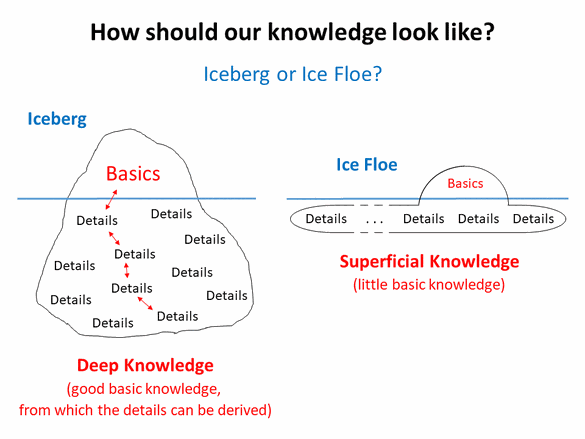
The ice floe means that a person knows a lot of details in a subject area, but when he has to solve a problem, he can assign some details, but not a whole chain of details to this particular case. The chain is only recognized by people who can analyze the problem and therefore know which big and small rules have to be applied to the problem.
So students should practice analyzing during their studies and on all other occasions. At every lecture, they should ask themselves: what is important, what is not so important? If the lecturer does not explain well, it is advisable to answer any unanswered questions after the lecture by doing one' own research. If this cannot be done in a short time, there is nothing left but to memorize the content for the exam. Perhaps it will be possible to understand the context later.
Under no circumstances should you become resigned. Students with the same attitude can help each other. Small successes motivate you to keep working. If you drop out of your studies at all, your time was not wasted, because you can use your analytical skills in life.
"As Nobel laureate Herbert Simon wisely stated, the meaning of “knowing” has shifted from being able to remember and repeat information to being able to find and use it." (https://nap.nationalacademies.org/read/9853/chapter/3#5, p. 5)
Everyone must decide for themselves how he or she learns or teaches. In my opinion, these are the three most important rules when studying:
- If you want to acquire deep expertise, you have to practice analyzing.
- If you want to get through your studies well, you have to try to organize stress away.
- If you want to develop your personality, you should stay humble, learn from others and help others.
On Learn-Study-Work, analyzing and finding new ideas to solve problems is explained, see "How to solve problems", "How to analyze situations = systems", "How to be creative".
